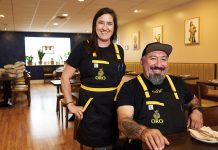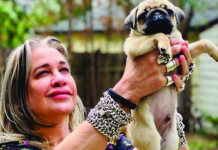
Photo by Tyson Crockett
Minnesotans have seen a lot of Commissioner Jan Malcolm lately. The head of the Minnesota Department of Health has been a fixture in press briefings since the beginning of the novel coronavirus outbreak. “Every day has its own twists and turns,” says Malcolm, who memorably held out an elbow to Vice President Mike Pence when he tried to shake her hand during a visit to 3M in March.
She first served as commissioner in 1999-2003 in Gov. Jesse Ventura’s administration, and returned to the role in 2018, first reporting to Gov. Mark Dayton and now to Gov. Tim Walz. Throughout the COVID-19 crisis, her quick and sober response has drawn comparisons to the approach of Dr. Anthony S. Fauci, the director of the National Institute of Allergy and Infectious Diseases.
We chatted with Malcolm to learn more about her day-to-day work and her long-term vision for health in Minnesota.
[Editor’s note: This interview was conducted prior to George Floyd’s killing on May 25.]
What are your goals for protecting the long-term health and welfare of Minnesotans?
One of the things I hope comes out of this is a renewed appreciation for how important preparedness is. New threats emerge all the time and, in recent years, they’ve been emerging more quickly—as the world’s economy is so interconnected, as people are moving around so quickly. Also, environmental changes are happening that seem to be accelerating the development of some pathogens. The big lesson is: We need to be constantly operating in a state of scanning for what is the next thing, in a heightened state of preparedness. I heard a great story by an environmental health scientist saying what we really need is the public health equivalent of the weather forecasting service, which is always looking for hurricanes. We should be doing the same thing with infectious diseases.
What differences have you noticed working with Gov. Ventura vs. Gov. Walz?
I have had the rather unique opportunity to work with three different governors: Gov. Ventura 20 years ago, Gov. Dayton in the last year of his term, and now Gov. Walz. Each one has been an honor to work for, all very committed to Minnesota and working really hard to best serve the state. They have very different personalities, certainly, and different approaches to problem solving. I guess I would say that’s true in working in government or in any sector. You’re working with leaders of different styles and skills, and it’s important to learn how to support your boss and what he or she needs from you.
What has gone into the decisions made by the State of Minnesota in response to COVID-19 so far?
We really look for nuances in things and for the interrelationships between the issues. For every decision we make, we’re looking at not only the impact on trying to slow the progression of the disease, but on using that time to intentionally ramp up healthcare capacity and make the best possible use of the time. As we’re able to continue loosening some of the restrictions, we’re going to have to do it in a way that protects public health by adopting best practices around social distancing. How can people continue to really take to heart—which Minnesotans clearly have—protecting ourselves and each other? Much credit goes to Minnesotans themselves for taking this seriously and incorporating new behaviors for the good of everyone.
You’re passionate about providing access to care to people of different socioeconomic statuses. What lessons do we need to learn from this?
This is pointing out the vulnerabilities in our system: the fact that healthcare access is tied to employment for so many; the fact that so many people live so close to the edge in a financial security sense; and how easy it is for individuals and families to be thrown into economic chaos without much of a safety net. Just the fragility of the whole system. There’s just so many lessons to be learned. Healthcare access is one. Things like paid leave. When we say, from a health perspective, “The best thing you can do is stay home if you’re sick to stop the spread of an infectious disease,” that’s easier said than done if you’re someone who doesn’t have any benefits around paid leave. There are a whole bunch of issues we’re beginning to appreciate—not only the important individual implications, but the broader societal interests, as well.

Photo by Tyson Crockett
One of your first assignments as commissioner was to investigate cases of elder abuse and restore trust in how the elderly are treated. Can you give us more detail on how that has played out?
At the health department, some of our basic operational systems were collapsing at the weight of volume. We had not been sufficiently on top of making sure our systems were keeping up. A big part of what needs to happen is to strengthen the consumer protections and regulatory framework around assisted living. With the support of the long-term providers and consumer advocates, [in 2019] we passed a really good piece of legislation to create a clearer regulatory framework around assisted living. That was a real victory. We’re in the process of implementing that now. I don’t deserve personal credit for the turnaround—it was a lot of people’s really hard work to rebuild the systems and get on top of it. We’ve been working for two years to redesign a lot of what we do in that part of the department.
What are you doing to continue to advocate for the elderly during COVID-19?
Unfortunately, that work has had to slow down because everybody’s focused on managing the epidemic. In long-term care settings, like nursing homes, memory care units, assisted living, and other kinds of group homes for people with disabilities—those environments are vulnerable to the spread of the disease. It’s been a real challenge for the long-term care provider industry. We’re working really hard with them on prevention strategies, doing the difficult but really necessary work of restricting visitation policies to try to minimize people bringing the virus into the facilities, carefully screening residents for symptoms, isolating them if they’re ill, and, unfortunately, restricting people eating together. It’s really sad because those meals are very important to people. But for their protection, those activities have had to change a lot. I’m really mindful of how tough that work is.
I’m so sorry to hear about your spouse Kris passing away this winter. It must be difficult to process loss in the middle of this. Do you mind sharing a memory of Kris with our readers?
I certainly miss her support and her company. It’s pretty tough going from one big challenge on a personal level into another. So yeah, 2020 has not been my favorite year. But I imagine her telling me to buck up and keep going. She was a great problem solver and definitely not one to wallow too much in navel gazing or to get paralyzed by challenges. I try to channel her energy a little bit every now and then.
I heard you were considering retirement but want to help as much as possible with the current emergency. What are your plans now?
I wouldn’t call it semi-retired, but I was very happily working at the University of Minnesota on a great project with some great colleagues less than full-time. That was really nice to have a little more time for myself to spend with my mom and with Kris and in my garden. [Now] I can’t imagine when I’m going to be able to garden. Right now, I’m just trying to think, literally, one day at a time about just what needs to be done. I’m not thinking at this point about retirement. I love this job. It’s such an honor to be part of the public health system in Minnesota.
How has working from home been?
People find it hard to believe how much of an introvert I am, but I’m a pretty big introvert. At first I thought, ‘This is great, no commute time. The coffee pot is never far away.’ Several weeks into it now, I’m really missing people. Even though I’m seeing them and talking to them constantly, it’s just not the same as being with your colleagues and interacting and problem solving in person.
What are your favorite things to do for fun in the Twin Cities? What are you excited to get back to?
I’m sure we all miss going to our favorite restaurants, especially during the nice summer weather, sitting on our great patio spots at restaurants and being with friends. I’m glad that we are very much encouraged to go outside and enjoy the outdoors and get exercise, in a good socially distancing way. I look forward to being able to reconnect with people and friends and gather with family, see my mom without worrying about any concerns there. Going out to dinner with friends. Golfing with friends. All things I miss doing and look forward to doing again.
Find out more about Commissioner Malcolm’s work for the Minnesota Department of Health at health.state.mn.us









